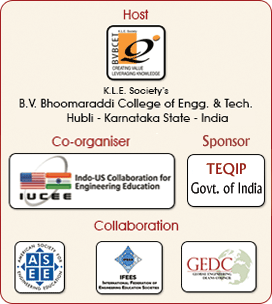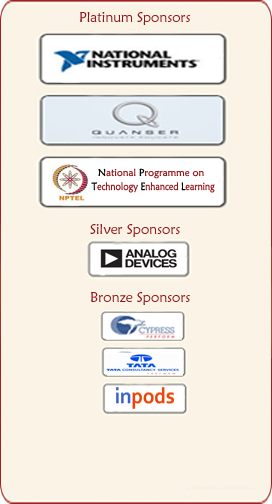Sharing Best Practices of Transformations in Learning Outcomes at Engineering Institutions |
Keynote Speakers
The highlight of the Conference is a set of keynote addresses by leaders in Engineering Education. Three keynote addresses are offered as part of the conference. Please refer program schedule for the exact schedule and venue.
| Dr.Natarajan on “Challenges of Engineering Education in India” | |||
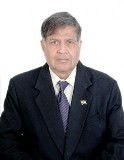 |
R Natarajan received his B.E. degree in Mechanical Engineering from the University
Visvesvaraya College of Engineering (of the then Mysore University) in 1961.
Subsequently he obtained the M.E. degree of the Indian Institute of Science,
Bangalore; and the M.A.Sc and Ph.D degrees from the University of Waterloo,
Canada. He has worked as a National Research Council Fellow in Canada, and as a
Humboldt Research Fellow in Germany. |
||
| Dr. F.C. Kohli “Vision for Engineering Education in India” | |||
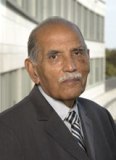 |
Born in Peshawar (Pakistan), Faqir Chand Kohli completed his schooling and matriculation in Peshawar. He obtained BA and B.Sc.(Hons.) degrees from Punjab University - Government College, Lahore. Thereafter, he went to Queen’s University, Canada and received his B.Sc.(Hons.) degree in Electrical Engineering in 1948. He worked with the Canadian General Electric Company for a year, and proceeded to the Massachusetts Institute of Technology, Cambridge, USA, where he received his MS degree in Electrical Engineering. In the latter part of 1950 and early 1951, he worked with Ebasco International Corporation, New York Connecticut Valley Power Exchange, Hartford; and with New England Power System, Boston for training in Power System Operation Planning. Kohli returned to India in early August 1951, and joined Tata Electric Companies and helped to set up the Load Despatching System to manage the system operations. He then became the General Superintendent in 1963, and Deputy General Manager in 1967. Simultaneously, he worked as consultant to Tata Consulting Engineers. He became Director of Tata Electric Companies in 1970. During his years with Tata Electric Companies, he introduced advanced engineering and management techniques for the operation of power systems. He also was responsible for significant use of digital computers for power system design and control, using the CDC 3600 mainframe computer at the Tata Institute of Fundamental Research. In 1968, Tata Electric Companies installed the Westinghouse digital computer to control the operations of the entire grid of Tata Electric Companies, which comprised three hydro stations, thermal units and energy supply from Tarapore Atomic Energy and Koyna Hydroelectric of Maharashtra State Electricity Board. This was a significant achievement for India as there were only four other utilities in the US that had opted for digital controls. UK, Germany, France and Japan at that point in time were using Analogue controls. In September 1969, he moved to Tata Consultancy Services as General Manager. Be it the propagation of computerisation in India at a time when no one realized its potential, or bringing the benefits of IT to India’s rural masses through computer based Adult Literacy programme, Kohli saw IT as an instrument of national development. He has been working on advancing engineering education at undergraduate level to world standards to create a large pool of students for undertaking graduate studies and research. With IIT Bombay and Ministry of Information Technology he initiated the project to graduate 3000 Microelectronic engineers at Masters level. He indicated the need for IT use within the country in all spheres of activity some years back and this has taken shape in terms of affordable computers and Open-source software in Indian Languages. A visionary and pioneer by nature, is acknowledged as the ‘Father of the Indian Software Industry’. F C Kohli is a fellow of IEEE USA, IET UK, Institution of Engineers India, Computer Society of India and many others. He has received Doctorate in Engineering (Honoris Causa) from the University of Waterloo, Canada in 1990, from Robert Gordon University in 2000, Aberdeen, U.K., University of Roorkee, UP in 2000, from IIT Bombay in 2004, Jadavpur University, Kolkata in 2004 and IIT Kanpur 2006. He has received many awards including the prestigious Dadabhai Naoroji Memorial Award in 2001 and was conferred the Padma Bhusan in the year 2002. Latest Awards
|
||
| Dr. Sugata Mitra “Engineering Education in the Cloud” | |||
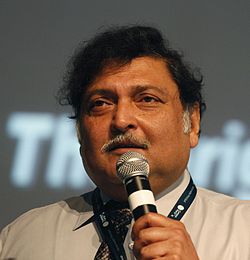 |
Sugata Mitra (born 12 February 1952) is Professor of Educational Technology at the School of Education, Communication and Language Sciences at Newcastle University, England. He is best known for his "Hole in the Wall" experiment, and widely cited in works on literacy and education. He is Chief Scientist, Emeritus, at NIIT. He is also the winner of the TED Prize 2013.Mitra has been described as a polymath by the University of London, as his 30 years of research spans a wide range of disciplines.
|
||
| Latest Announcements | ||
| Conference 16 - 18 January 2014 |
||
